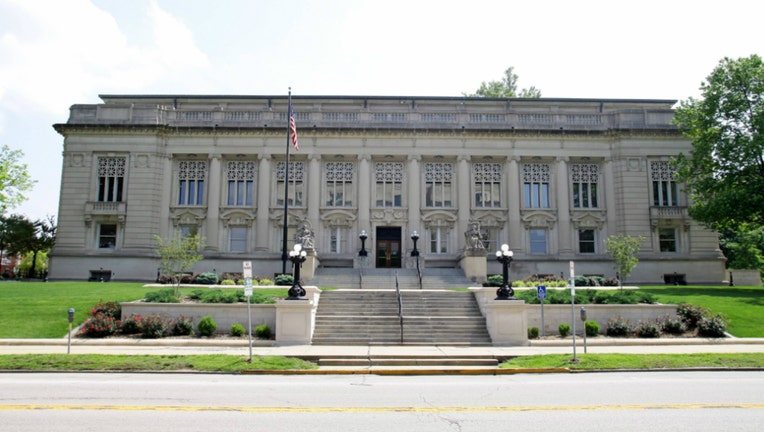Illinois Supreme Court rules CPD misconduct files must be preserved

The Supreme Court Of Illinois Building, in Springfield, Illinois. (Raymond Boyd/Michael Ochs Archives/Getty Images)
SPRINGFIELD, Ill. - The Illinois Supreme Court ruled Thursday that Chicago can keep all records of complaints against police officers that are more than five years old, delivering a victory for police reform advocates who say the records are crucial to keeping track of officers accused of brutality and misconduct.
Though the ruling is part of a legal battle that started long before last month’s death of George Floyd in Minneapolis, it deals with many of the issues that demonstrators have raised at the widespread protests over Floyd’s death, racial inequality and police accountability.
The Chicago Police Department has long been dogged by a reputation for brutality and misconduct, particularly in regard to its treatment of people of color, so keeping the older records of complaints against officers is seen as crucial for monitoring the most problematic ones.
The police union, the Fraternal Order of Police, argued that its contract with the city requires that older complaints be destroyed. But in its 6-1 ruling affirming a previous appellate court ruling, the state Supreme Court determined that a contract cannot supersede state law.
“While the parties are generally free to make their own contracts, this court has long held that when a conflict exists between a contract provision and state laws, as it clearly does in this case, state law prevails,” Justice Lloyd Karmeier wrote in the majority opinion.
Craig Futterman, a University of Chicago law professor, said it is impossible to overstate the significance of the ruling.
“If the court ruled the other way, if a Chicago police officer kills another black child tomorrow (or) if he killed somebody else six years ago, that evidence would be gone,” said Futterman, who has fought for years to preserve police complaints and who filed a brief on behalf of several civil rights organizations in this case.
Chicago Mayor Lori Lightfoot, who has made police reforms a cornerstone of her administration, said the ruling will be crucial in the effort to restore public faith in the police force.
“For way too long, we have not been as transparent as we need to be in this city,” she told reporters at an an unrelated news briefing. “We have to have accountability and legitimacy, and that can’t come if we hide from the public documents that underscore what has happened with disciplinary investigations and records in our city.”
FOP President John Catanzara was bitterly disappointed in the ruling, saying that preserving reports could hurt and haunt police officers in the city for years to come, whether or not they did anything wrong.
“These records can be used to smear officers’ names forever,” Catanzara said. He said the union might appeal the decision to the U.S. Supreme Court and, because the ruling makes no distinction between unions, he might reach out to teachers unions and other unions to gauge their interest in joining an appeal.
The ruling is particularly significant because it affects a union that represents some 12,000 rank-and-file officers in the nation’s third largest city. And it is an issue that has been raised around the country, where citizen complaints against law enforcement agencies are largely kept secret, either because of a law or, like Chicago until Thursday’s ruling, a union contract.
Police unions have fought in contract negotiations and in state legislatures for confidentiality and in some cases records are erased after as little as two years. After California passed a law requiring police departments to release information about misconduct claims in certain cases, including when officers were found to have improperly used force or fired their weapons, several departments destroyed decades of records or filed lawsuits asking that the law not apply to files from before the law took effect last year.
Police departments nationwide have been facing intense scrutiny since the May 25 death of Floyd, a handcuffed black man who died after a white Minneapolis police officer used his knee to pin Floyd’s neck to the ground as he begged for air.
The ensuing protests have sent cities and states scrambling to come up with new rules regarding the use of force by police officers, with many banning chokeholds. Just days ago, President Donald Trump signed an executive order that would establish a database that tracks police officers with excessive use-of-force complaints in their records. New York state lawmakers recently repealed a decades-old law that has kept law enforcement officers’ disciplinary records secret.
The state Supreme Court ruling is the latest chapter in a legal battle that started well over a decade ago. It has already led to the creation of a massive database of police misconduct allegations involving Chicago police officers called the Citizens Police Data Project. When it was launched in 2015, it included 56,000 allegations of misconduct against 8,500 officers, making it the largest public database of its kind in the U.S.
The database revealed what critics have said is a widespread and longtime effort to condone and even cover up police misconduct. It showed that only 2% of officers who received misconduct complaints during a five-year period were ever disciplined.
Among the officers who were the subject of numerous complaints but never disciplined was Jason Van Dyke, who was convicted of second-degree murder in the 2014 shooting of death of Laquan McDonald. Before Van Dyke shot the black teenager 16 times, he was the subject of 20 citizen complaints during his 13 years on the force, including eight for the alleged use of excessive force. He wasn’t disciplined over any of them.

